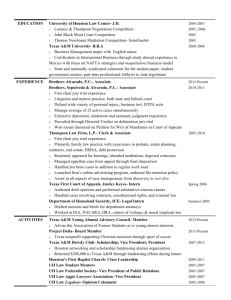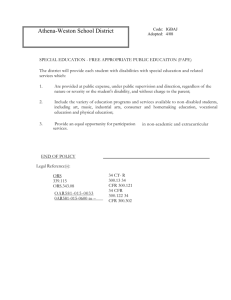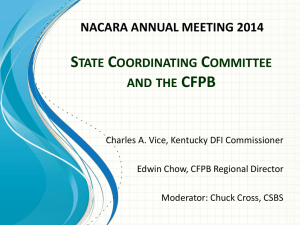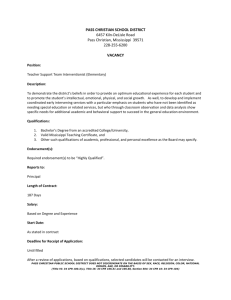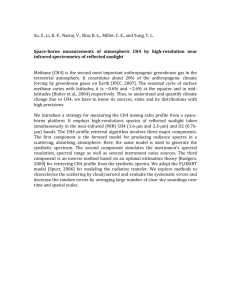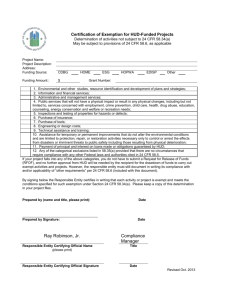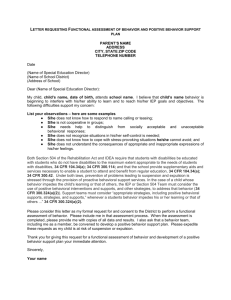2.13 NACARA Spouse & Child Article
advertisement
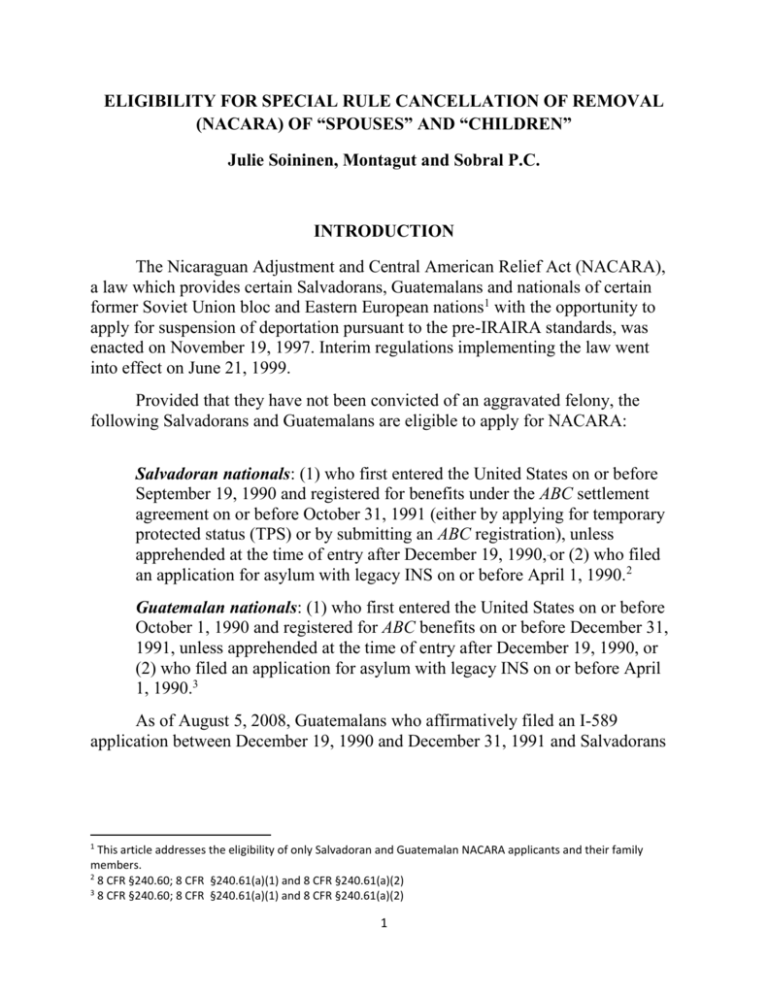
ELIGIBILITY FOR SPECIAL RULE CANCELLATION OF REMOVAL (NACARA) OF “SPOUSES” AND “CHILDREN” Julie Soininen, Montagut and Sobral P.C. INTRODUCTION The Nicaraguan Adjustment and Central American Relief Act (NACARA), a law which provides certain Salvadorans, Guatemalans and nationals of certain former Soviet Union bloc and Eastern European nations1 with the opportunity to apply for suspension of deportation pursuant to the pre-IRAIRA standards, was enacted on November 19, 1997. Interim regulations implementing the law went into effect on June 21, 1999. Provided that they have not been convicted of an aggravated felony, the following Salvadorans and Guatemalans are eligible to apply for NACARA: Salvadoran nationals: (1) who first entered the United States on or before September 19, 1990 and registered for benefits under the ABC settlement agreement on or before October 31, 1991 (either by applying for temporary protected status (TPS) or by submitting an ABC registration), unless apprehended at the time of entry after December 19, 1990, or (2) who filed an application for asylum with legacy INS on or before April 1, 1990.2 Guatemalan nationals: (1) who first entered the United States on or before October 1, 1990 and registered for ABC benefits on or before December 31, 1991, unless apprehended at the time of entry after December 19, 1990, or (2) who filed an application for asylum with legacy INS on or before April 1, 1990.3 As of August 5, 2008, Guatemalans who affirmatively filed an I-589 application between December 19, 1990 and December 31, 1991 and Salvadorans 1 This article addresses the eligibility of only Salvadoran and Guatemalan NACARA applicants and their family members. 2 8 CFR §240.60; 8 CFR §240.61(a)(1) and 8 CFR §240.61(a)(2) 3 8 CFR §240.60; 8 CFR §240.61(a)(1) and 8 CFR §240.61(a)(2) 1 who affirmatively filed an I-589 application between December 19, 1990 and October 31, 1991 are also eligible for NACARA benefits.4 Although there are still NACARA eligible principals who have not yet applied for benefits, or whose cases are pending adjudication, increasingly the majority of potential clients who may be eligible for NACARA benefits are the spouses and children of NACARA principals. ELIGIBILITY FOR NACARA OF SPOUSES AND CHILDREN Pursuant to 8 CFR 240.61(a)(4), an alien who is the spouse or child of a NACARA principal at the time a decision is made to suspend the deportation or cancel the removal (of the principal) is also eligible for NACARA benefits. Based on the plain language of the regulation, the relationship between the principal and the spouse or child needed to have existed at the time that the NACARA principal was granted the benefit; the subsequent termination of the relationship due to death/divorce or due to a child turning 21 or marrying is of no legal consequence. Similarly, the naturalization of the principal has no impact on the family member’s eligibility. Family members must be able to demonstrate that their relationship with the principal met the legal definition of “spouse” or “child” pursuant to the INA at the time that the principal was granted benefits. The spousal relationship must have been legally valid and recognized in the place where the relationship was created.5 Pursuant to INA §101(b)(1), a “child” is defined as one who is unmarried and under 21. Illegitimate children meet the legal definition of “child” if they were legitimated under the law of the child's residence or domicile, or under the law of the father's residence or domicile, whether in or outside the United States, if such legitimation took place before the child reached the age of eighteen years. 6 Stepchildren meet the legal definition of child if the child was under 18 at the time of the marriage which created the relationship.7 Unlike “follow to join” beneficiaries in employment and family based cases, the NACARA principal need not sign any documents to authorize the NACARA filing of their family member and need not participate in their family member’s case. The NACARA application of the spouse or child will need to include the 4 See memo of Joseph Langlois, Chief of Asylum Division; Making ABC Registration Determinations, Chaly Garcia v. U.S., 508 F.3d 1201 (9th Cir. 2007) August 5, 2008. 5 Matter of Bautista, 16 I&N Dec. 602 (BIA 1978) 6 INA §101(b)(1)(C) 7 INA §101(b)(1)(B) 2 name and alien number of the principal NACARA beneficiary as well as legally sufficient evidence of their relationship to the principal at the time of the grant. In additional, clearly it will be necessary for counsel to ascertain the date that the NACARA principal was granted the benefit in order to analyze the eligibility of the spouse or child. DIFFERENCES BETWEEN THE CASES OF NACARA PRINCIPALS AND NACARA SPOUSES AND CHILDREN Unlike NACARA principals, spouses and children applying for NACARA benefits can be from any country and need not have previously filed any applications with INS or USCIS. Having been apprehended at entry is not a bar to their eligibility for NACARA. Unlike NACARA principals, spouses and children are not entitled to the presumption of extreme hardship, although as with principal applicants, hardship to the applicant can be considered in assessing whether the extreme hardship standard has been met. In practical terms, although technically spouses and children need to be able to articulate and perhaps even demonstrate the “extreme hardship”, practitioners will usually find that this standard is not difficult to meet insofar as at the time of the adjudication of the application, the applicant has resided in the U.S. for an extended period of time and usually has one or more legal permanent resident or U.S. citizen family members in the U.S. SIMILARITIES BETWEEN THE CASES OF NACARA PRINCIPALS AND NACARA SPOUSES AND CHILDREN The following requirements/standards apply to both NACARA principals and their spouses and children: a. Time does not stop with the service of an NTA or OSC or with the commission of a crime; an application for NACARA is a continuing one 8 b. Applicants need to prove that they have been physically present in the US and have been a person of good moral character for at least 7years 9 8 IRAIRA § 309(f)(1), added by NACARA § 203(b). See also, In re Garcia 24 I&N Dec. 179 (BIA 2007) But see, Cuadra v. Gonzales, 417 F.3d 947 (8th Cir. 2005) Aragon-Salazar v. Holder, 10/2/2014 (9th Cir) 9 IRAIRA § 309(f)(1), added by NACARA § 203(b); 8 CFR § 240.66(b) 3 c. False testimony for an immigration benefit and fraud, including marriage fraud, do not bar an applicant from NACARA eligibility but will render them unable to show good moral character during the statutory period10 d. Nacara spouses and children are eligible to apply for heightened standard NACARA once ten years has passed since the event or commission of the crime which renders them inadmissible or removable11 e. Applicants who enter without inspection are subject to the grounds of inadmissibility at Section 212 of the INA and applicants who enter with inspection are subject to the grounds of removability at Section 237 of the INA 12 f. Crewman, nonimmigrant exchange aliens, applicants inadmissible or deportable under security grounds and those previously granted suspension of deportation are ineligible for NACARA13 g. Applicants who fail to appear at a removal hearing or fail to comply with a voluntary departure order are ineligible for NACARA 14 h. USCIS cannot grant NACARA benefits to one subject to an outstanding order of removal or deportation i. Applicants are not ineligible for NACARA even if they have executed an order of removal or deportation by departing the US and have subsequently reentered illegally 15 j. Applicants who have been habitual drunkards and those otherwise precluded from establishing good moral character are unable to demonstrate eligibility for NACARA until seven years have passed since the event(s) which render them unable to establish good moral character16 k. Drug addicts and drug traffickers are not eligible for NACARA but former drug addicts and drug traffickers may be able to demonstrate eligibility for heightened standard NACARA17 l. Applicants who have provided material support to a terrorist group or have participated in the persecution of others are not eligible for NACARA benefits18 10 INA § 101(f)(6) IRAIRA § 309(c)(5)(C), amended by NACARA § 203(a); 8 CFR §240.65(c) 12 8 CFR 240.66(b)(1); See also, Memo from Joseph Langlois, Chief Asylum Division: Changes to NACARA Lesson Plan and Quality Assurance Review Categories (9/6/07), See also, Reyes v. Holder 714 F.3d 731 (2nd Circuit, 2013) 13 8 CFR 240.66(a) 14 8 CFR 240.66(a) 15 New section 309(h) of IRAIRA, added by Section 1505 of the LIFE Amendments. See also, Memo of Joseph Langlois, Director, Asylum Division: Implementation of Amendment of the Legal Immigration Family Equity Act (LIFE) regarding applicability of INA section 241(a)(5) (reinstatement) to NACARA 203 beneficiaries (2/22/01). 16 See, INA § 101(f). Alcoholics and those with DWI convictions are not necessarily “habitual drunkards”. See, Matter of H, 6 I&N Dec. 614 (BIA 1955). 17 8 CFR §240.65(c) 11 4 SPECIAL CASES Pursuant to 8 CFR 240.61(a)(5), unmarried children who are over 21 at the time that the principal is granted NACARA can apply for NACARA if they entered the US on or before October 1, 1990. The requirements are otherwise the same as for other NACARA spouses and children Pursuant to the Violence Against Women Act of 1998, H.R. 3514, 105th Congress (1998), spouses and children of NACARA principals who have been battered or subject to extreme cruelty can apply for NACARA if their relationship with the principal existed at the time that the principal was granted NACARA, applied for NACARA, registered for ABC Benefits, applied for TPS or applied for asylum. 19 JURISDICTIONAL ISSUES Spouses and children can apply with USCIS when they have seven years of continuous physical presence, assuming that they are otherwise eligible. If the principal was granted NACARA in deportation or removal proceedings, the spouse and children can only apply before and be granted relief by an Immigration Judge in proceedings.20 18 INA § 241(b)(3)(B)(I); INA § 212(a)(3)(B). Recent the government provided an exemption from the material support bar to applicants who provided certain types of support to the FMLN during the civil war in El Salvador and those who provided an “insignificant” amount of material support to a terrorist organization. 78 Fed. Reg 24225 4/24/13 and 79 Fed. Reg 6913 (2/5/14) 19 66 Fed Reg 37119 (7/17/01) 20 8 CFR § 240.62(a) and § 240.62(b). 5

